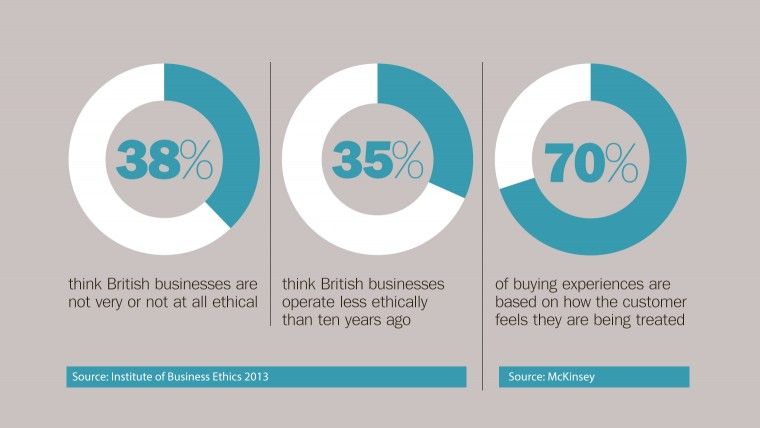Just as negotiations were nearly completion, John Michael, chief executive at data storage firm iStorage, threw out a bombshell. “Our software would need accrediting,” he said. “We knew it would meet it, but only by rewriting some coding, which would cause delays,” he recalls.
“To bag the deal we could have easily glossed over this, but this just isn’t us. The client was so pleased with our honesty, they decided to appoint us anyway. The result – in the last four months our business has grown in that country by 400 per cent.”
If there was ever an example of how sound, ethical selling can go hand in hand with profit, then this must surely be it. Contrast this with the experience Mr Michael says he recently had as a customer looking at kitchens: “The salesman quoted £35,000. I thought this was steep and I was right as I got another for £16,000. When I went back to the first one, he said he’d match it. It left a very bad taste.”
At a time when sales is still mired with mis-selling scandals, only the slimmest of suspicions that sales professionals are behaving unethically is all that’s needed to reinforce old stereotypes. “In choosing one brand over another, consumers are already worried they’ve made the wrong choice,” says Eve Poole, author of Ethical Leadership in a Global World. “It’s never been more vital for salespeople to show spotless ethical standards.”
She says protecting professional reputation should be easy. “Selling is about trust and trustworthiness has been expressed in the following equation: credibility plus reliability plus intimacy over self-reliance. The top part is what salespeople have to max-out on,” she adds.
MANAGEMENT PRESSURE
But Thomas Beschorner, a researcher at the Institute of Business Ethics, University of St.Gallen, in Switzerland, believes it’s often the context of the organisation, its management or reward and target structure that causes corners can be cut. “The system salespeople are in can force personal ethics aside and then staff have to face the question of who they are loyal to – their employer or the customer,” he says.
This dilemma explains why sales staff may adopt a patter that is subversive to their employer – “I’m not supposed to say this, but this cheaper product is just as good.” He adds that even if the advice is genuinely given, it can still sound unethical, if customers suspect it is trained behaviour, designed to manipulate them.
Selling is about trust
“This is why no one salesperson can shoulder the reputation of a whole industry,” says Simon Culver, head of Avaya UK. “What they can do, however, is be as honest and professional as they can. What we make sure we do is back this up, with top-to-bottom processes ensuring we don’t pressurise staff to sell-in before quarter-end periods, or cause undue urgency to meet targets.
“Clients fill in quarterly surveys on how the sales process was, so this is another check to ensure our sales staff protect our values. Reputation is really all about transferring brand values.”
TRAINING
Large firms like Avaya and Virgin specifically train their staff on ethics. “Training lasts three to six months, with specific modules on this,” says Mario Di’Mascio, executive director for sales at Virgin Media Business. “Sales is all about trust and good sales is about repeat business, not quick wins. We believe the relationship between good practice and profit is crystal clear.”
The biggest purchase most people make is a place to live and Which? recently found 51 per cent of Britons don’t trust estate agents. Peter Buckingham, head of sales at Leicestershire estate agent Andrew Granger & Co, says: “Our sector does suffer a trust issue, especially recently because of sealed bids. People think the sales process is not honest and that we push up prices. To counter this we insist on using genuine sealed envelopes opened in front of clients. It means we genuinely have no idea what the offers are.”
At a broad level, ethics awareness is increasing. “We accept that if a culture of management encourages bad behaviour, then quickly salespeople don’t think to question it,” says Andy Hough of the Sales Leadership Alliance. “That’s why we’re striving to promote good ethics as being about business longevity. People in sales have to be ‘influencers’ – that’s OK – but right now we’re researching what good ethics looks like, with a view to developing a kite mark on sales training processes, so customers can feel confident they have been treated correctly.”
With customers increasingly aware of good ethics, and prepared to buy from those who offer service and value, it’s clear maintaining good reputation builds brands and businesses. “We have our own code of ethics, and badge and certify that our staff are doing the right thing,” says Andrew Lawson, managing director of salesforce.com. “In IT reputation follows you; it’s a small world and customers move with you as we develop new products. Being known to provide what they want is vital. We know there is absolutely a correlation between profits and ethics. What we’re saying though is that without ethics nowadays, you don’t have a business – full stop.”

